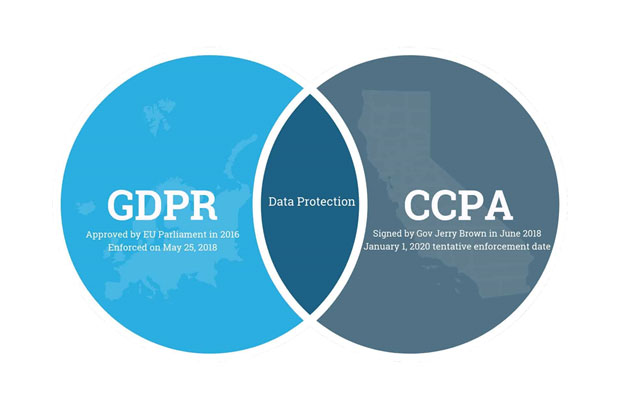The world is becoming more and more technologically advanced even now as you are reading this blog post. In a fast-paced tech-world, data is being generated faster than ever. For businesses and organizations this means that data should be adequately and permanently stored in the most ethical way possible. That is why governments are most definitely imposing regulations on how this data is being processed by companies everywhere in the world. This is where GDPR and CCPA come into place.
GDPR
GDPR stands for General Data Protection Regulation and is referred to as beingthe strongest privacy and security law in the world. GDPR imposes all organizations in the world that store and target data, obligations. Ultimately, redefining the way an online user’s data is being handled.
CCPA standing for California Consumer Privacy Act, was just made effective on January 1, 2020. CCPA, considered to be a less stricter version of GDPR, requires business privacy policies to include information on consumers’ privacy rights. Meaning, that consumers of any business online have the right to request for their data to be deleted if they wish to do so. Nonetheless, how to make the decision of which regulation to comply with? Then, you have come to the right place!
GDPR Laws
GDPR laws apply to any form of online business, non-profit organization, even webpages of public institutions. Pretty much any entity that stores personal data from the European Union. On the other hand, CCPA is limited to data subjects that legally reside in California and only affect for-profit organizations that have yearly revenues of $25 million or higher, collect and buy the data, and earn 50% of their overall revenue from selling said data. Concerning their requirements, GDPR are much more detailed. Data subjects, individuals or organizations whose data belongs to, must be immediately informed if information regarding their data has been shared from another entity, no matter the intention.
CCPA only requires companies to send reports to their data-subjects if their personal information has been shared or used 12-months after any data breach has been made. Regarding penalties, GDPR’s financial penalties for data breaches might even go as high as €20 million. CCPA’s penalties are slightly different and softer than GDPR’s. The penalties might range from $100 to $2,500, depending on the severity of violation.
Now that you know more about both, have you made a decision yet? Well, even if you cannot make a decision right away, one thing is certain, you do need a secure software to help your business safely convert data into code in order to prevent unauthorized access if you do not want to get fined by the GDPR and CCPA’s laws. Let BitTruster help you by managing BitLocker data encryption and you won’t have to worry about getting fined from either.Simplify your BitLocker data encryption by using BitTruster! Make your workplace a safe place! Who knew data encryption management could be so simple?



